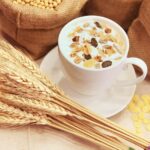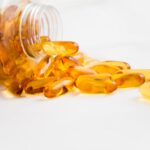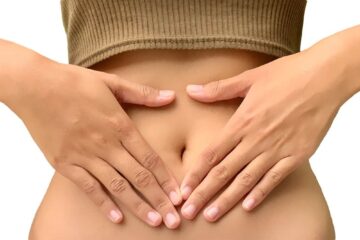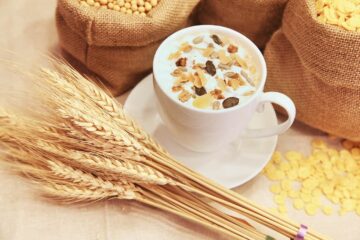Stream this Podcast episode:
Summary:
- Fiber is a very important nutrient for gut health in IBD
- Timing of fiber is critical to long-term success
- Avoiding fiber at the wrong times can perpetuate the “viscous cycle”
Related Posts:
- Symptoms of Ulcerative Colitis vs Crohn’s Disease
- Ulcerative Colitis vs Crohn’s Disease: What You Need to Know (Plus One Treatment Tip!)
- Best Type of Fiber For IBD / Crohn’s / U.C. (Backed By Research)
- Is Fish Oil Good for Crohn’s / U.C. / IBD?
Accompanying Article:
In this episode, we’re going to get to the bottom of how much fiber you really should be trying to eat each day if you have IBD / Crohn’s Disease / Ulcerative Colitis.
The truth is that fiber is sort of a tricky topic when it comes to IBD.
On the one hand, higher fiber intakes have been consistently correlated with a reduced risk of developing IBD as well as likely helping to protect from IBD progression.[1, 2]
Similarly, avoidance of fiber is associated with a greater risk of IBD flair ups.[3]
However, as many of you with IBD have learned first-hand, fiber can sometimes increase symptoms such as boating and abdominal pain. Sometimes, it seems as though fiber is actually causing a flair up!
So, how do we reconcile this discrepancy?
Well, one factor (out of a few) is that the TIMING of the fiber intake is important!
Why WHEN You Eat Fiber Matters
One situation that is common for those with IBD is that at some point in time, they consumed some food that was high in fiber (beans, nuts, vegetables, etc.), and it seemed to make them worse.
Moreover, this situation likely happened more than once.
From these experiences, they logically concluded that fiber just doesn’t agree with them, and they will be better off avoiding it.
However, what I want to get across to you today is that this is very short-term thinking…
…and it is this type of thinking that will keep you trapped in the “viscous cycle” in which you keep going from doing okay to back into another flair-up (on repeat).
It is true that, at certain times, fiber can increase symptoms and seem to make things worse.
However, at other times, you body may handle fiber perfectly fine, and it may even reduce your symptoms.
(Of course, making sure to choose the right TYPE of fiber is also critically important here.)
By learning when to decrease your fiber intake and when to increase your fiber intake, you can start to take some control back and help yourself gain some freedom from IBD.
This is because fiber plays many beneficial roles for the colon, including helping to maintain a healthy and diverse microbiome, helping to produce short-chain fatty acids that act as a major energy source for the colon as well as imparting anti-inflammatory activity, and helping to potentially improve mucosal healing and prolong remission![4, 5]
When to Lower the Fiber
In general, if you are in an active flair up or have significant symptoms, you don’t want to start raising your fiber intake.
In fact, this is the time to dial it back.
When the gut is actively inflamed, it won’t respond as well to the fiber intake, and the fiber will be more likely to contribute to gut irritation and possibly an increase in symptoms.
(However, there are some types of fibers that the gut still usually tolerates very well, even during an active flair up. Yet, in general, most types of fibers should be reduced during this stage.)
This is the time to limit ourselves to some safer foods / meals, so the gut has a chance to heal and come out of the flair up.
When to Increase the Fiber
As your symptoms lower and you find yourself in a better place, this is when you should DELIBERATELY begin to start diversifying your palate and incorporating more fiber into your daily diet.
This is very important.
Those who stay too afraid to start adding fiber back in again are setting themselves up to be at a higher risk of another flair sooner. [3] They are encouraging the “viscous cycle”.
However, start slow. Don’t just go from 5g of fiber per day to 40g.
A good strategy would be to increase your daily fiber intake by about 5g every few days to every week, depending on how you are responding.
Choosing safer and better types of fibers will also definitely help.
A good target to shoot for would be about 30-40g of fiber per day when your gut is doing well. (Though some people can even benefit from higher amounts at times, there is no need to go crazy with it.)
As you play around with different types of foods and fiber, you’ll start to see a pattern on which you are responding well to compared to which you are not. All fiber is definitely NOT made equally!
Conclusion
I hope this helps you with your ongoing IBD journey!
Keep in mind, this is just ONE aspect to fiber. There is a LOT more to cover.
If you haven’t yet enrolled in my new FREE mini-course “IBD: Get Your Fats Right“, you definitely will want to.
In it, I show you exactly why the types of fats that you are consuming can have a major impact on your disease and symptom progression. Most people underestimate just how important of a role fats play in IBD. By “getting your fats right”, you’ll be setting yourself up for some great IBD success!
This is NOT your generic “eat good fats, avoid bad fats”.
There is critical information in this course that you haven’t heard anywhere else.
And it’s free, so check it out now!
Warmly,
Dr. Sean
References:
- Liu X, Wu Y, Li F, Zhang D. Dietary fiber intake reduces risk of inflammatory bowel disease: result from a meta-analysis. Nutr Res. 2015 Sep;35(9):753-8. doi: 10.1016/j.nutres.2015.05.021. Epub 2015 Jun 3. PMID: 26126709.
- Chiba M, Tsuji T, Nakane K, Komatsu M. High amount of dietary fiber not harmful but favorable for Crohn disease. Perm J. 2015;19(1):58-61. doi:10.7812/TPP/14-124
- Brotherton CS, Martin CA, Long MD, Kappelman MD, Sandler RS. Avoidance of Fiber Is Associated With Greater Risk of Crohn’s Disease Flare in a 6-Month Period. Clin Gastroenterol Hepatol. 2016 Aug;14(8):1130-6. doi: 10.1016/j.cgh.2015.12.029. Epub 2015 Dec 31. PMID: 26748217; PMCID: PMC4930425.
- Brotherton CS, Taylor AG, Bourguignon C, Anderson JG. A high-fiber diet may improve bowel function and health-related quality of life in patients with Crohn disease. Gastroenterol Nurs. 2014;37(3):206-216. doi:10.1097/SGA.0000000000000047
- Pituch-Zdanowska A, Banaszkiewicz A, Albrecht P. The role of dietary fibre in inflammatory bowel disease. Prz Gastroenterol. 2015;10(3):135-141. doi:10.5114/pg.2015.52753






